February 2020
This quarterly newsletter has been created by Wayne RESA literacy consultants for literacy educators. In each issue, you will find Literacy Learning Network updates and information, statewide initiative updates, book synopses, teaching and coaching strategies, and upcoming professional learning opportunities. We look forward to partnering with you as we engage in best practices in literacy instruction for all students.
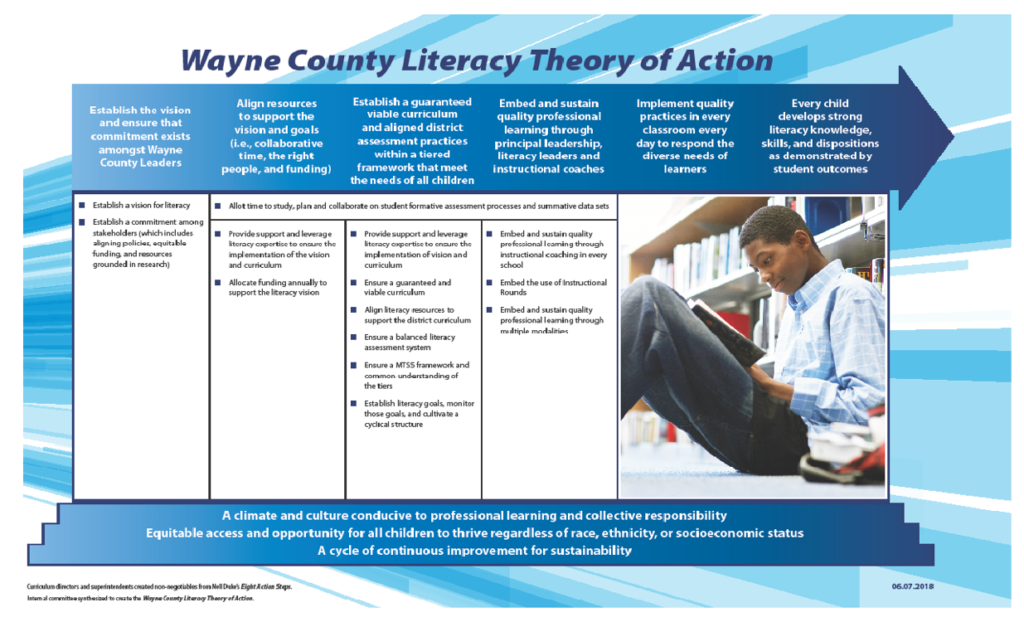
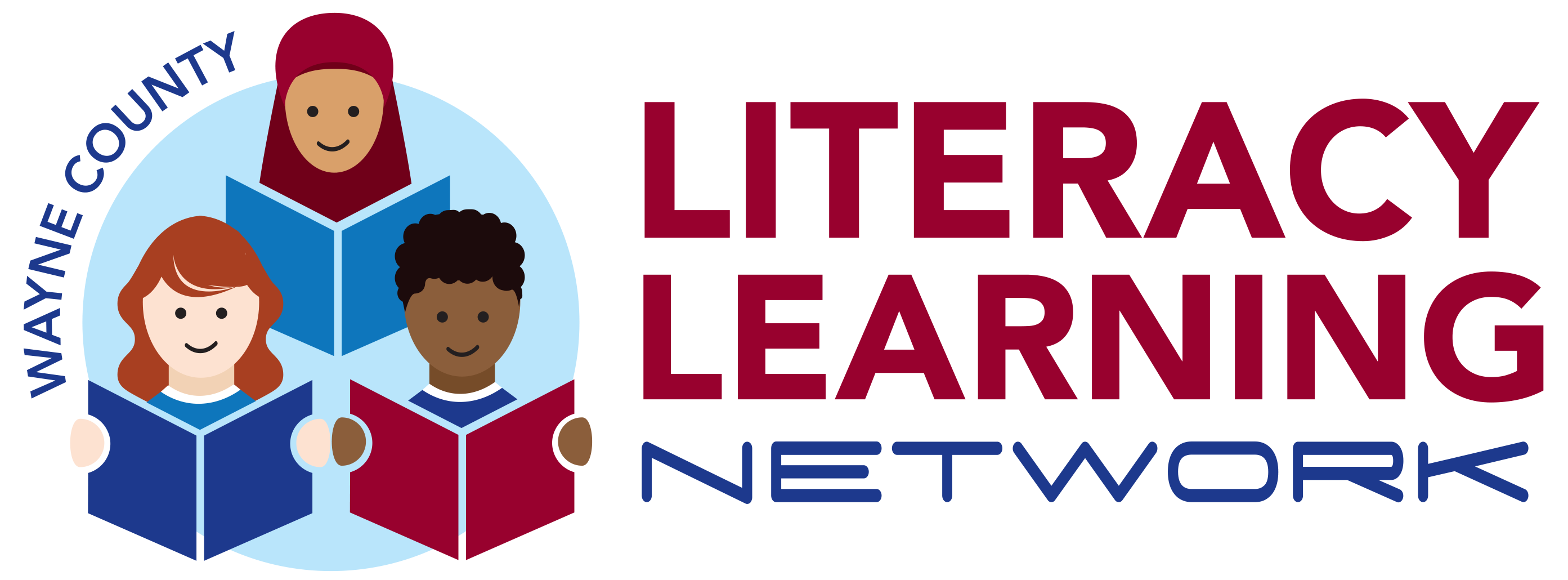
Updates

Designing Tiered Systems of Support through Effective Scheduling
When it comes to ensuring high levels of learning for all students, we know that having strong Tier 1 core instruction is paramount. In fact, it is the foundation on which a multi-tiered system of supports (MTSS) is built. MTSS offers an organizational framework that focuses on key priorities and allows us to make certain that every child receives the support needed to succeed. Putting this system in place, however, requires dedication, intentionality, and leveraging how time is spent during the school day.
The creation of an effective school schedule is a key component of every principal’s work. While creating a schedule requires a team approach, the responsibility ultimately falls on each building’s instructional leader. This can be daunting. For example, there is value in creating and sustaining professional learning communities, but finding the time for teachers to engage in this important work can be a struggle. Additionally, research has shown the necessity of uninterrupted blocks of literacy instruction, especially in the early grades, but how do we go about holding this time sacred? “Within the school schedule resides the power to address problems and to facilitate the successful implementation of effective instructional practices” through “supportive structures [including]:
- Common planning time;
- Common teaching time;
- Common time for intervention and enrichment;
- Special service personnel scheduled in tandem with general education colleagues; and
- Extended planning time provided for teams on an occasional basis” (Rettig, 2007).
Wayne RESA welcomes Dr. Michael D. Rettig as he outlines problems with typical school schedules, relates general principles for effective school scheduling, provides a process for creating quality schedules, and shares examples and templates based upon his 40+ years of experience in schools. Join Dr. Rettig at his upcoming sessions on March 10 and March 11: MTSS Supports – Elementary School Scheduling and MTSS Supports – Secondary School Scheduling.
Coaching Intensives Come to Wayne County

Since her inauguration in 2019, Governor Whitmer has made literacy a top priority, and her recent budget promises to triple the number of literacy coaches in Michigan. The Governor has done her research; Jim Knight (2012) noted that schools with coaches show a 95% increase in teachers using new instructional strategies in their classrooms. In an effort to meet the professional learning needs of literacy coaches, the MAISA GELN Early Literacy Task Force, with unremitting support from Erin Brown and Dr. Susan L’Allier, have created a series of Intensive Literacy Coaching Institutes. Throughout the state, the Institutes have been offered to literacy coaches as a way to hone their skills in an authentic setting, giving coaches an opportunity to work directly with teachers and students. Erin Brown explains, “The benefits […] are numerous and the supports [created] across the four days together are meaningful and lasting.” While the framework of the Coaching Intensive is tied to the Essential Coaching Practices for Elementary Literacy, the opportunity to hear from key researchers about a particular practice from the Essential Instructional Practices in Early Literacy, reinforced through professional reading, gives literacy coaches an opportunity to consider why the strategy is essential as well as how to help teachers implement it in their classrooms. Furthermore, in collaborating with others over the course of the Coaching Intensive, coaches are able to build connections and form a supportive community of learners. Wayne RESA is proud to have four trained facilitators who have held two Coaching Intensives in Wayne county exclusively for Wayne county literacy coaches. Currently, two more Coaching Intensives are planned for the spring in an effort to continue to build capacity and sustainability in coaches and district coaching models. A unique feature of the Wayne county Coaching Intensives has been to add a mentorship program; this program offers individualized professional learning through which one of our facilitators continues to work with a coach on a particular goal. This layered system of support has been critical to the success of literacy coaches, and in the words of one of the participants, coaches often leave with “a much better sense of [themselves] as a coach.”
Statewide Updates
Wayne RESA, in collaboration with the Disciplinary Literacy Task Force, is hosting two one-day regional institutes designed to generate an initial understanding and awareness of disciplinary literacy and the Essential Practices for Disciplinary Literacy Instruction in the Secondary Classroom document. This institute is open to Intermediate School District consultants and administrators, institutions of higher education, and professional organizations that support mathematics, science, social studies, and English language arts instruction across Michigan. Learning will be facilitated by lead researchers Dr. Elizabeth Moje and Dr. Darin Stockdill, along with Disciplinary Literacy Task Force members, to strengthen and bring coherence to the work occurring around literacy in secondary classrooms. This workshop will be offered again on March 10, 2020, and is open to instructional coaches, central office administrators, building administrators, and teacher leaders, as well as Intermediate School District Consultants.
The annual Michigan School Testing Conference consists of a day for workshops and two days of plenary and clinic sessions. On Tuesday, February 11, six half-day and two full-day workshops will be offered. The conference itself will take place on Wednesday and Thursday, February 12-13. Click here to view and download the promotional booklet and registration form.
Oakland, Wayne and Macomb county schools have until Feb. 24 to apply for a Southeast Michigan School Garden mini-grant that could provide up to $1,500 for schools to support garden programming during the 2020 grant year. With funding provided by the Community Foundation for Southeast Michigan, Michigan State University Extension will award approximately 15 grants for schools or early care and education sites that are planning or implementing school garden programming. Grant awards will range from $500 – $1,500. In addition to funding, grantees will receive training, technical assistance, and connection to a network of peers.
Books and Strategies

Book Talk
Igniting Passion in Readers of All Ages
Mommy’s Khimar
Jamilah Thompkins-Bigelow
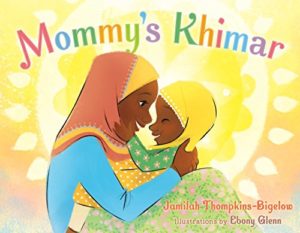 The young protagonist in this colorful picture book spends the day wrapped in her mother’s yellow khimar, imagining that she is the sun, a queen, a superhero, and a bird. The khimar connects her completely to her mother, and she feels a deep sense of pride while playing dress-up. Throughout the day, she encounters her grandmother, Muslims at the mosque, and her Arabic teacher, and each reinforces her joy at keeping her mother near, “even when she’s away.”
The young protagonist in this colorful picture book spends the day wrapped in her mother’s yellow khimar, imagining that she is the sun, a queen, a superhero, and a bird. The khimar connects her completely to her mother, and she feels a deep sense of pride while playing dress-up. Throughout the day, she encounters her grandmother, Muslims at the mosque, and her Arabic teacher, and each reinforces her joy at keeping her mother near, “even when she’s away.”
Wild Bird
R.J. Palacio
 In her first graphic novel, Wonder author R. J. Palacio adds depth to Julian’s character through the story of his Grandmère’s youth, wherein he discovers the origin of his name. Set in France in the 1940s, Grandmère (Sara) recounts the horrors of World War II as the Nazis descend upon her village, forcing her into hiding. Aided by her classmate Julian and his family, Sara survives, and her vivid narrative reinforces the power of simple human kindness.
In her first graphic novel, Wonder author R. J. Palacio adds depth to Julian’s character through the story of his Grandmère’s youth, wherein he discovers the origin of his name. Set in France in the 1940s, Grandmère (Sara) recounts the horrors of World War II as the Nazis descend upon her village, forcing her into hiding. Aided by her classmate Julian and his family, Sara survives, and her vivid narrative reinforces the power of simple human kindness.
For Black Girls Like Me
Mariama J. Lockington

Makeda Kirkland is dealing with much more than the average middle schooler. Life as an adopted child has had its challenges, but after moving across the country to New Mexico, Keda faces an even greater crisis than trying to fit in with her new classmates. Her father’s job with the symphony has forced him to travel more, and in his absence, Keda’s mother grows from eccentric to detached. After leaving for an unexpected camping trip in the middle of the night, Keda and her sister begin to understand the often fragile nature of their mother’s mental health. In working together to help her, Keda realizes that family encompasses more than bloodlines and heredity.
Just Mercy
Bryan Stevenson
 In this riveting autobiography, Bryan Stevenson recounts his work with multitudes of resourceless prisoners, condemned to death row or life in prison. While each prisoner had different circumstances, the common thread was an inability to procure proper legal representation. Stevenson’s selflessness, accompanied by his relentless work ethic, led to the relief of countless prisoners. His work also influenced penal law, such as the elimination of death penalty charges for children and the mentally ill. He continues to fight against injustice as the executive director of the Equal Justice Initiative, the nonprofit organization he founded as a fledgling lawyer.
In this riveting autobiography, Bryan Stevenson recounts his work with multitudes of resourceless prisoners, condemned to death row or life in prison. While each prisoner had different circumstances, the common thread was an inability to procure proper legal representation. Stevenson’s selflessness, accompanied by his relentless work ethic, led to the relief of countless prisoners. His work also influenced penal law, such as the elimination of death penalty charges for children and the mentally ill. He continues to fight against injustice as the executive director of the Equal Justice Initiative, the nonprofit organization he founded as a fledgling lawyer.
A Novel Approach
Kate Roberts
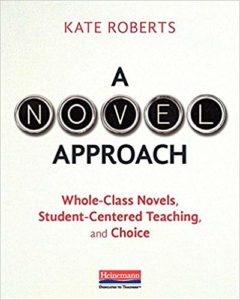 In an effort to combine the shared joy of whole class novels with the engaging possibilities of choice reads, author and teacher Kate Roberts details her decision to incorporate both in the secondary classroom. Her book is a practical guide for teachers that includes simple ways to assess students’ reading skills, important considerations for whole class texts, strategies for planning units and minilessons, techniques for facilitating independent reading, and unique assessments that inspire creative responses. More resources, including videos, are available online, providing educators with models of instruction to increase students’ engagement and enjoyment of adolescent literature.
In an effort to combine the shared joy of whole class novels with the engaging possibilities of choice reads, author and teacher Kate Roberts details her decision to incorporate both in the secondary classroom. Her book is a practical guide for teachers that includes simple ways to assess students’ reading skills, important considerations for whole class texts, strategies for planning units and minilessons, techniques for facilitating independent reading, and unique assessments that inspire creative responses. More resources, including videos, are available online, providing educators with models of instruction to increase students’ engagement and enjoyment of adolescent literature.
Collaborative Coaching for Disciplinary Literacy
Piper, L’Allier, Manderino & Di Domenico
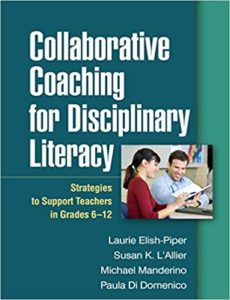 At the secondary level, it has often been assumed that literacy instruction falls into the hands of the ELA teachers. Yet, the Common Core Standards have urged educators to consider the discipline-specific ways experts and their apprentices communicate. Thus, as instruction shifts from the “sage on the stage” to encouraging students to read, write, think, and speak like disciplinary experts, perhaps no one will play a more important role than the literacy coach. These four scholars provide secondary level coaches with a model, strategies, tips and resources to effect positive change in essential instructional practices.
At the secondary level, it has often been assumed that literacy instruction falls into the hands of the ELA teachers. Yet, the Common Core Standards have urged educators to consider the discipline-specific ways experts and their apprentices communicate. Thus, as instruction shifts from the “sage on the stage” to encouraging students to read, write, think, and speak like disciplinary experts, perhaps no one will play a more important role than the literacy coach. These four scholars provide secondary level coaches with a model, strategies, tips and resources to effect positive change in essential instructional practices.
The 2020 Census and our Schools

Last month, the U.S. Census Bureau began its “once-a-decade count” in Alaska. While many citizens dutifully complete the questionnaire, some resist. A recent study revealed “five barriers that might prevent people from participating in the census: concerns about data privacy and confidentiality, fear of repercussions, distrust in all levels of government, feeling that it doesn’t matter if you are counted, and belief that completing the census might not benefit you personally” (CBAMS, 2019). Yet, the results of the census have political, educational, and economic implications, which is why the U.S. Census Bureau has spent the past two years and millions of dollars on a campaign to educate citizens, particularly underrepresented populations, about its importance. From live Facebook events to toolkits for community challenges, the U.S. Census Bureau has tried to reach across numerous outlets to send its very simple message: Be counted. What do the numbers mean to schools? The statistics generated by the census influence federal funding, which supports a plethora of educational programs such as Head Start, Title 1, free and reduced lunches, professional learning
opportunities for teachers, and more. In an effort to help students understand the importance of census participation, the U.S. Census Bureau has created a Statistics in Schools program. Statistics in Schools provides content-specific, standards-aligned activities for students at all grade levels. Teachers can download the resources and activities, all of which focus on locating, evaluating and using data. Some teachers may also be interested in becoming a teacher ambassador for the Statistics in Schools Ambassador Program and can email CLMSO.SISambassador@census.gov for more information. Ultimately, by giving students authentic experiences with data, teachers can bolster their statistical literacy, with particular attention to how data drives decision-making.
Noteworthy News
In a recent press release, Martin Ackley explains that “while racial and ethnic minorities make up a growing percentage of Michigan’s student population, only two percent of the state’s educators are black males.” In response to this growing need, the newest #proudMIeducator video features three DPSCD teachers who explain their critical roles in the classroom and in their students’ lives.
In the latest Top 10 in 10 video, Chief Deputy State Superintendent Sheila Alles celebrates the growth of CTE programs throughout the state of Michigan which have seen a 75% increase in completion rates over the past five years.
This blended-learning symposium will use real-life examples to highlight the many opportunities for social and emotional learning within the K-12 academic curriculum. In this unique environment, participants will have the chance to interact with the authors directly via a live stream and process their learning in facilitated small groups at several locations across our state. All attendees will receive a copy of the book All Learning Is Social and Emotional by Frey, Fisher and Smith (2019) through which they affirm the effectiveness of SEL on student outcomes, such as “social and emotional skills, attitudes, [and] positive social behavior” (Durlak et al., 2011).
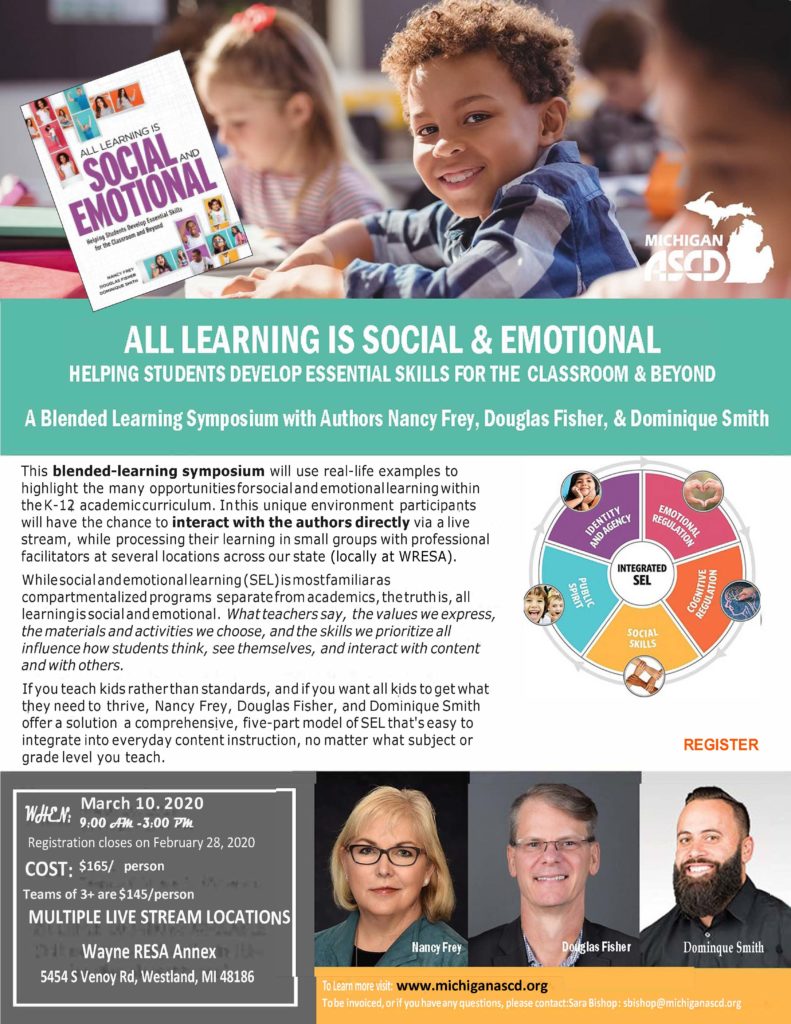
Professional Learning
| Upcoming Events at Wayne RESA |
| See the Professional Growth pages on the Wayne RESA site for links to course offerings, their descriptions, and online registration. |
| Elementary |
| Jan Richardson – Teaching Reading in Small Groups, K-3: February 25 |
| Join Jan Richardson as she brings her years of experience as a reading specialist, Reading Recovery teacher leader, best-selling author, and national literacy consultant to share best practices in providing small group reading instruction, a critical component of a balanced literacy program. Dr. Richardson will demonstrate how to use student assessment data to plan targeted instruction to meet individual needs, and participants will leave with a wealth of strategies to refine and energize their instructional delivery using precise assessment tools, detailed lesson plans, targeted reading strategies, and guided writing support. Workshop participants will receive Dr. Richardson’s popular professional book: The Next Step Forward in Guided Reading. The audience for this workshop includes K-3 classroom teachers, reading specialists, literacy coaches, elementary resource room teachers, and members of the leadership team. For additional information, contact Debra Reeves. |
| Leslie Blauman: Writer’s Workshop – Making It Real: May 12 |
| Are you looking for ways to strengthen your students’ engagement, skill and independence as writers? Join national literacy consultant Leslie Blauman, author of Kid-Tested Writing Lessons for Grades 3-6 and The Inside Guide to the Reading-Writing Classroom, and explore effective classroom structures and strategies that support engagement in authentic, sustained writing. As they examine key components of the writing process and the architecture of the one-to-one conference, participants will refine their skill in noticing and naming writers’ strengths and challenges to determine next steps for instruction. For additional information, contact Bridget Regan. |
| MTSS Supports – Elementary School Scheduling: March 10 |
| The creation of an effective school schedule is a key component of every elementary principal’s work. While many different personnel should be involved in the process, to delegate this responsibility is to abdicate the role of instructional leader. Based upon 40+ years of experience working in schools across the country, Dr. Michael D. Rettig, professor emeritus from James Madison University, founder of School Scheduling Associates, and co-author of Elementary School Scheduling: Enhancing Instruction for Student Achievement (Eye on Education, 2008), will outline problems which have been identified in typical elementary school schedules, relate general principles for effective elementary school scheduling, provide a process for creating quality schedules, and share examples and templates. The intended audience for this course includes superintendents, curriculum directors, elementary principals, members of the leadership team and/or district/school improvement team. For additional information, contact Colleen Whalen. |
| Stephanie Harvey – Integrating Literacy and Content Learning: May 6 |
| Are you searching for a way to effectively immerse students in the richness and intrigue of content area learning while at the same time supporting their on-going literacy development? Join world-renowned literacy specialist and best-selling author, Stephanie Harvey, for an inspiring day exploring researcher’s workshop—a powerful and authentic instructional approach which adapts the familiar structures of reader’s and writer’s workshop to support students’ engagement and independence as learners. Throughout this workshop, Harvey will address the six cornerstones which foster thoughtful learning, including curiosity, workshop, content, comprehension, collaboration, and environment, which together provide a strong foundation for inquiry at every grade level across the curriculum. For additional information, contact Debra Reeves. |
| Storytelling with Digital Media: March 19 |
| Makerspaces encourage teachers to develop interactive opportunities for students as they develop products for a wide range of purposes and audiences. In this workshop, participants will discover ways to inspire active storytellers through digital media that tap into multiple literacies to create meaning. Participants will explore green screens and stop animation, e-book creations, and more. All participants will receive a stop animation starter kit and The Green Screen Maker Space Project Book. The intended audience for this course is K-12 educators. For additional information, contact Laura Gabrion. |
| Secondary |
| 180 Days – Reimagining Language Arts Instruction: April 20, May 7, June 1 and June 9 |
| In this interactive course, Penny Kittle and Kelly Gallagher will demonstrate how they: (1) plan a year of instruction; (2) design specific units of study; and (3) plan and execute daily lessons. Participants will have an opportunity to reimagine units of study using Gallagher’s and Kittle’s newest book 180 Days and Michigan’s Essential Practices for Disciplinary Literacy Instruction in the Secondary Classroom. Participants will also explore ways to deepen student engagement through diverse texts, integrate various compelling reasons for writing for real audiences and authentic purposes, and learn to examine student work as data for making instructional decisions. The intended audience for this course is secondary language arts teachers, instructional coaches, reading specialists, and instructional leaders (6-12 Essential Practices #2, #4, & #8 are the focus of this series). For additional information, contact Rosalyn Shahid. |
| Academic Conversations – Classroom Talk Leading to Content Understanding: March 12 and March 26 |
| Academic conversations push students to think and learn in lasting ways. Academic conversations are back-and-forth dialogues in which students focus on a topic and explore it by building, challenging, and negotiating relevant ideas. This workshop supports Essential Practices for Disciplinary Literacy Instruction in the Secondary Classroom #10: Metadiscursive awareness within and across academic and cultural domains (attention to language use at the “meta” level, e.g. talking about talk). Participants will receive a copy of Academic Conversations. The intended audience for this course includes grades 5-8 educators. For additional information, contact Rosalyn Shahid. |
| Building Reading and Writing Connections through Choice in the Secondary ELA Classroom: February 10 and March 9 |
| Whole-class novels? Student choice? In Kate Roberts’ A Novel Approach, she provides strategies that blend student-centered with whole-class reading. By exploring this method, participants will learn how to deepen students’ critical thinking, academic and content vocabulary acquisition, and writing through the use of Reader’s and Writer’s Notebook. Participants will also develop conferencing, formative assessment, and small group instruction techniques that will increase students’ understanding of the reading and writing connection. The intended audience for this course is secondary ELA teachers. (This series will focus on 6-12 Essential Disciplinary Literacy Practices #2, #3, #4, #5 and #7). For additional information, contact Mary-Lu Strimbel |
| MTSS Supports – Secondary School Scheduling: March 11 |
| The creation of an effective school schedule is a key component of every school principal’s work. While many different personnel should be involved in the process, to delegate this responsibility is to abdicate the role of instructional leader. Based upon 40+ years of experience working in schools across the country, Dr. Michael D. Rettig will focus on middle and high school scheduling possibilities. He will share many different models of scheduling, discuss the pros, cons, costs, and research related to these models, and outline an adoption and implementation process. The intended audience for this course includes superintendents, curriculum directors, secondary principals, members of the leadership team and/or district/school improvement team. For additional information, contact Colleen Whalen. |
| Coaching |
| Wayne County Coaching Foundations: March 2 (face-to-face date is followed by six online sessions) |
| Designed as a boot-camp for new and prospective coaches, this series examines key components of coaching. Join us as we explore what literacy coaching is and how it can lead to systemic improvement within a school or district. In this foundational course, we delve into the skills necessary to be an effective literacy coach, including nurturing a growth mindset, developing relational trust, active listening, meaningful use of data, and providing effective feedback. Discover how the Essential Coaching Practices for Elementary Literacy connect with the other components of the Essential Practices in Early and Elementary Literacy and learn how to integrate these core elements into successful practice. The intended audience for this course is new or aspiring literacy coaches. For additional information, contact Michelle Wagner. |

Resources: Where can I find...
Tired of the limited templates offered in Google Slides? Spice up those presentations with free designs from SlidesCarnival, SlidesMania, and Slidesgo!
The MAC Resource Bank provides educators with several one-page Learning Points aligned to Michigan’s Assessment Literacy Standards. Each condensed and easy-to-read Learning Point is designed to improve assessment practices and increase assessment literacy.
Wayne RESA Literacy Team
Meet Mary-Lu Strimbel

Mary-Lu Strimbel is a Literacy Consultant for Wayne RESA with over twenty years of experience in education. Mary-Lu has a Bachelor of Science degree in Elementary Education and a Master of Arts degree in Middle Level Education. She is a certified facilitator for the MAISA Intensive Coaching Institute, and she has supported teachers, principals and coaches in the development and implementation of research-based instructional practices and curriculum development as well as assessment development and purpose. Mary-Lu has experience as a teacher, literacy coach and reading interventionist at the elementary and secondary levels. Using a focus of collaborative inquiry, Mary-Lu also works with adult learners when designing and implementing professional development. Her goal is to help educators build their instructional capacity so they increase their students’ confidence and success.
We look forward to hearing from you!
Laura Gabrion
Debbie Reeves
Bridget Regan
Rosalyn Shahid
Mary-Lu Strimbel
Mari Treece
Michelle Wagner
Colleen Whalen
Mellissa Wilson
If this newsletter has been forwarded to you, and you’d like to subscribe to it, please contact Laura Gabrion.
![]() 33500 Van Born Road • Wayne, MI 48184 • 734.334.1300 • 734.334.1620 fax • www.resa.net
33500 Van Born Road • Wayne, MI 48184 • 734.334.1300 • 734.334.1620 fax • www.resa.net
Board of Education
James S. Beri • Mary E. Blackmon • Danielle Funderburg • Lynda S. Jackson • James Petrie
Randy A. Liepa, Ph.D., Superintendent
“Use Your Megaphone”: Inspiring Excellence in Literacy Instruction Read More »